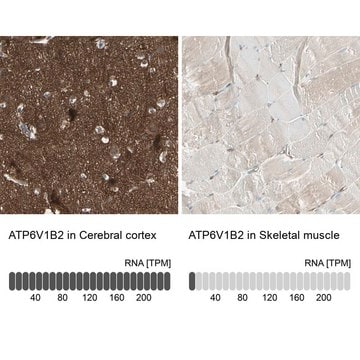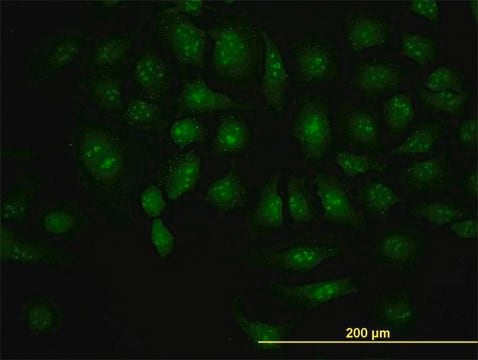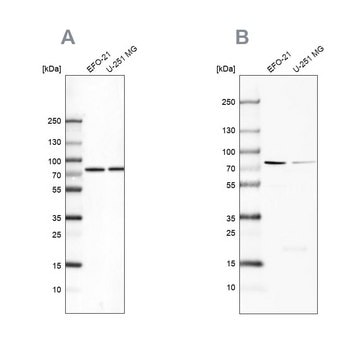SAB1402125
Monoclonal Anti-ATP6V1A, (C-terminal) antibody produced in mouse
clone 4F5, purified immunoglobulin, buffered aqueous solution
Synonym(e):
ATP6A1, ATP6V1A1, HO68, VA68, VPP2, Vma1
About This Item
Empfohlene Produkte
Biologische Quelle
mouse
Konjugat
unconjugated
Antikörperform
purified immunoglobulin
Antikörper-Produkttyp
primary antibodies
Klon
4F5, monoclonal
Form
buffered aqueous solution
Mol-Gew.
antigen ~38.21 kDa
Speziesreaktivität
human
Methode(n)
immunofluorescence: suitable
immunohistochemistry (formalin-fixed, paraffin-embedded sections): suitable
indirect ELISA: suitable
western blot: 1-5 μg/mL
Isotyp
IgG1κ
NCBI-Hinterlegungsnummer
UniProt-Hinterlegungsnummer
Versandbedingung
dry ice
Lagertemp.
−20°C
Posttranslationale Modifikation Target
unmodified
Angaben zum Gen
human ... ATP6V1A(523)
Allgemeine Beschreibung
Immunogen
Sequence
TLEVAKLIKDDFLQQNGYTPYDRFCPFYKTVGMLSNMIAFYDMARRAVETTAQSDNKITWSIIREHMGDILYKLSSMKFKDPLKDGEAKIKSDYAQLLEDMQNAFRSLED
Biochem./physiol. Wirkung
Physikalische Form
Haftungsausschluss
Not finding the right product?
Try our Produkt-Auswahlhilfe.
Lagerklassenschlüssel
10 - Combustible liquids
WGK
WGK 1
Flammpunkt (°F)
Not applicable
Flammpunkt (°C)
Not applicable
Analysenzertifikate (COA)
Suchen Sie nach Analysenzertifikate (COA), indem Sie die Lot-/Chargennummer des Produkts eingeben. Lot- und Chargennummern sind auf dem Produktetikett hinter den Wörtern ‘Lot’ oder ‘Batch’ (Lot oder Charge) zu finden.
Besitzen Sie dieses Produkt bereits?
In der Dokumentenbibliothek finden Sie die Dokumentation zu den Produkten, die Sie kürzlich erworben haben.
Unser Team von Wissenschaftlern verfügt über Erfahrung in allen Forschungsbereichen einschließlich Life Science, Materialwissenschaften, chemischer Synthese, Chromatographie, Analytik und vielen mehr..
Setzen Sie sich mit dem technischen Dienst in Verbindung.








